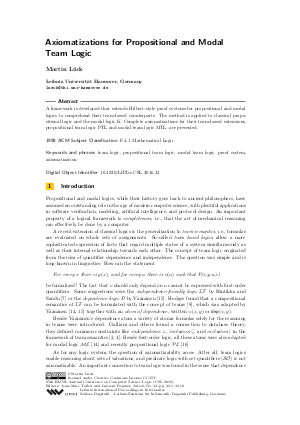Axiomatizations for Propositional and Modal Team Logic
Author Martin Lück
-
Part of:
Volume:
25th EACSL Annual Conference on Computer Science Logic (CSL 2016)
Part of: Series: Leibniz International Proceedings in Informatics (LIPIcs)
Part of: Conference: Computer Science Logic (CSL) - License:
 Creative Commons Attribution 3.0 Unported license
Creative Commons Attribution 3.0 Unported license
- Publication Date: 2016-08-29
File

PDF
LIPIcs.CSL.2016.33.pdf
- Filesize: 0.55 MB
- 18 pages
Document Identifiers
Subject Classification
Keywords
- team logic
- propositional team logic
- modal team logic
- proof system
- axiomatization
Metrics
- Access Statistics
-
Total Accesses (updated on a weekly basis)
0Document
0Metadata
Abstract
A framework is developed that extends Hilbert-style proof systems for propositional and modal logics to comprehend their team-based counterparts. The method is applied to classical propositional logic and the modal logic K. Complete axiomatizations for their team-based extensions, propositional team logic PTL and modal team logic MTL, are presented.
Cite As Get BibTex
Martin Lück. Axiomatizations for Propositional and Modal Team Logic. In 25th EACSL Annual Conference on Computer Science Logic (CSL 2016). Leibniz International Proceedings in Informatics (LIPIcs), Volume 62, pp. 33:1-33:18, Schloss Dagstuhl – Leibniz-Zentrum für Informatik (2016)
https://doi.org/10.4230/LIPIcs.CSL.2016.33
BibTex
@InProceedings{luck:LIPIcs.CSL.2016.33,
author = {L\"{u}ck, Martin},
title = {{Axiomatizations for Propositional and Modal Team Logic}},
booktitle = {25th EACSL Annual Conference on Computer Science Logic (CSL 2016)},
pages = {33:1--33:18},
series = {Leibniz International Proceedings in Informatics (LIPIcs)},
ISBN = {978-3-95977-022-4},
ISSN = {1868-8969},
year = {2016},
volume = {62},
editor = {Talbot, Jean-Marc and Regnier, Laurent},
publisher = {Schloss Dagstuhl -- Leibniz-Zentrum f{\"u}r Informatik},
address = {Dagstuhl, Germany},
URL = {https://drops.dagstuhl.de/entities/document/10.4230/LIPIcs.CSL.2016.33},
URN = {urn:nbn:de:0030-drops-65739},
doi = {10.4230/LIPIcs.CSL.2016.33},
annote = {Keywords: team logic, propositional team logic, modal team logic, proof system, axiomatization}
}
Author Details
References
-
William Ward Armstrong. Dependency structures of data base relationships. In IFIP Congress, pages 580-583, 1974.

- Pietro Galliani. Inclusion and exclusion dependencies in team semantics — On some logics of imperfect information. Annals of Pure and Applied Logic, 163(1):68-84, January 2012. URL: http://dx.doi.org/10.1016/j.apal.2011.08.005.
- Valentin Goranko and Martin Otto. Model theory of modal logic. In Johan Van Benthem Patrick Blackburn and Frank Wolter, editors, Handbook of Modal Logic, volume 3 of Studies in Logic and Practical Reasoning, pages 249-329. Elsevier, 2007. URL: http://dx.doi.org/10.1016/S1570-2464(07)80008-5.
-
Erich Grädel and Jouko Väänänen. Dependence and independence. Studia Logica, 101(2):399-410, 2013.

- Raul Hakli and Sara Negri. Does the deduction theorem fail for modal logic? Synthese, 187(3):849-867, 2012. URL: http://dx.doi.org/10.1007/s11229-011-9905-9.
-
Lauri Hella, Antti Kuusisto, Arne Meier, and Heribert Vollmer. Modal Inclusion Logic: Being Lax is Simpler than Being Strict. In Giuseppe F Italiano, Giovanni Pighizzini, and Donald T. Sannella, editors, Mathematical Foundations of Computer Science 2015, volume 9234, pages 281-292. Springer Berlin Heidelberg, Berlin, Heidelberg, 2015.

- Jaakko Hintikka and Gabriel Sandu. Informational Independence as a Semantical Phenomenon. In Studies in Logic and the Foundations of Mathematics, volume 126, pages 571-589. Elsevier, 1989. URL: http://dx.doi.org/10.1016/S0049-237X(08)70066-1.
-
Wilfrid Hodges. Compositional semantics for a language of imperfect information. Logic Journal of the IGPL, 5(4):539-563, 1997.

- Juha Kontinen, Julian-Steffen Müller, Henning Schnoor, and Heribert Vollmer. A van benthem theorem for modal team semantics. In 24th EACSL Annual Conference on Computer Science Logic, CSL 2015, September 7-10, 2015, Berlin, Germany, pages 277-291, 2015. URL: http://dx.doi.org/10.4230/LIPIcs.CSL.2015.277.
-
Juha Kontinen and Ville Nurmi. Team Logic and Second-Order Logic. In Logic, Language, Information and Computation, volume 5514, pages 230-241. Springer Berlin Heidelberg, Berlin, Heidelberg, 2009.

- Juha Kontinen and Jouko Väänänen. Axiomatizing first-order consequences in dependence logic. Annals of Pure and Applied Logic, 164(11):1101-1117, November 2013. URL: http://dx.doi.org/10.1016/j.apal.2013.05.006.
- Martin Lück. The axioms of team logic. CoRR, abs/1510.08786, 2016. URL: http://arxiv.org/abs/1510.08786.
- Katsuhiko Sano and Jonni Virtema. Axiomatizing Propositional Dependence Logics. In Stephan Kreutzer, editor, 24th EACSL Annual Conference on Computer Science Logic (CSL 2015), volume 41 of Leibniz International Proceedings in Informatics (LIPIcs), pages 292-307, Dagstuhl, Germany, 2015. Schloss Dagstuhl-Leibniz-Zentrum fuer Informatik. URL: http://dx.doi.org/10.4230/LIPIcs.CSL.2015.292.
-
Jouko Väänänen. Modal dependence logic. New perspectives on games and interaction, 4:237-254, 2008.

-
Jouko Väänänen. Dependence logic: a new approach to independence friendly logic. Number 70 in London Mathematical Society student texts. Cambridge University Press, Cambridge ; New York, 2007.

- Fan Yang. On extensions and variants of dependence logic. PhD thesis, University of Helsinki, 2014. URL: http://www.math.helsinki.fi/logic/people/fan.yang/dissertation_fyang.pdf.
